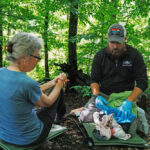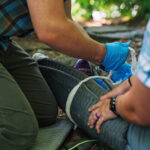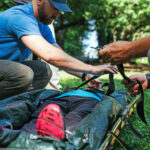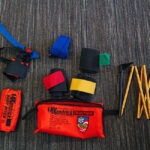SOLO Southeast’s Wilderness First Responder Recertification
This course is designed for individuals who hold a current WFR certification and need to re-certify before it expires and will brings you up to date with all new wilderness protocols along with refreshing your memory on standard WFR curriculum. This class also recertifies the wilderness component for WEMT’s.
Don’t have a SOLO Wilderness First Responder Certification? No problem! We offer reciprocity with several other schools allowing students to take our recert to update a current WFR. Please see details here.
Lodging: Available through NOC
Meals: Available through NOC’s Restaurants
Recommended For: Students whose current WFR Certification is due to expire.
Prerequisites: Previous WFR Certification
Certifications Received:
• 3-Year Wilderness First Responder Certification
For Financial Aid Resources and documents, click here.
Courses Dates
| Course | Dates | Location | Tuition | |
|---|---|---|---|---|
| Wilderness First Responder Recertification | Apr 20th - 21st, 2024 | Bryson City, NC | $285 | |
| Wilderness First Responder Recertification | May 16th - 17th, 2024 | Bryson City, NC | $285 | |
| Wilderness First Responder Recertification | Jun 22nd - 23rd, 2024 | Bryson City, NC | $285 | |
| Wilderness First Responder Recertification | Jul 27th - 28th, 2024 | Bryson City, NC | $285 | |
| Wilderness First Responder Recertification | Aug 5th - 6th, 2024 | Bryson City, NC | $285 | |
| Wilderness First Responder Recertification | Aug 24th - 25th, 2024 | Bryson City, NC | $285 | |
| Wilderness First Responder Recertification | Sep 21st - 22nd, 2024 | Bryson City, NC | $285 | |
| Wilderness First Responder Recertification | Oct 19th - 20th, 2024 | Bryson City, NC | $285 | |
| Wilderness First Responder Recertification | Nov 16th - 17th, 2024 | Bryson City, NC | $285 | |
| Wilderness First Responder Recertification | Dec 14th - 15th, 2024 | Bryson City, NC | $285 |
What You'll Learn
- Patient Assessment
- Treatment of Common Injuries
- Treatment of Medical Emergencies
- Basic Wilderness Survival Skills
- Introduction to Rescue and Evacuation
What To Expect
This course takes place at our SOLO Southeast classroom located on NOC’s main campus outside of Bryson City, NC. Course check-in will be at 8:00am. Students can plan to spend 8-10 hours/day in the course with breaks for meals. This course provides both hands-on and classroom-style training. We will have both indoor and outdoor scenarios, so dressing appropriately for the weather is a necessity. CPR & AED are not included in the course, but can be added on to the evening of the first day for an additional charge.
What's Included
- 3-Year SOLO Wilderness First Responder Certification
- Textbook
Packing List
Print the course packing list by clicking on the print icon to the right.
NOC provides the primary gear needed for each course. Students should plan to have seasonally appropriate clothing, as we will spend a significant amount of time outside. Please look at zip code 28713 for packing.
Necessary Items
- Backpack
- Rain gear
- Layers of clothing
- Hat
- Closed toe shoes
- Wrist watch (cell phone is not sufficient)
- Pen and notepad
- Sleeping bag or blanket*
- Sleeping pad*
- Small tarp, rain fly, or ground sheet*
- *Paddlers might bring gear that they would be likely to have on the river (PFD, float bags, etc)
- Headlamp
- Water bottle (at least 1 quart)
- Sunscreen and insect repellent
- Small personal first aid kit
Requirements
-
Current WFR certification (or within grace period from issuing agency).
-
Students must be at least 16 years of age to take this course. All minors must be accompanied by an adult.
Food & Drink
NOC’s Main Campus outside of Bryson City, NC is home to two onsite restaurants. Hours vary seasonally. View hours for River’s End Restaurant and Big Wesser Riverside Pub. Snacks are available for purchase at the General Store. Students in this program will receive a discount card for use at NOC’s restaurants during the course.
Lodging
NOC offers several different lodging options on our Main Campus. Our most popular for this course is our Shared Basecamp Lodging where you would be in a room with other participants in the course. Student’s receive a discounted rate on lodging. Please call to inquire.






